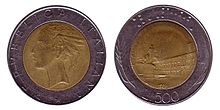- Coin rolling scams
-
Coin-rolling related scams are a collection of scams involving coin wrappers (rolls of coins). The scammer will roll coins of lesser value or slugs of no value, or less than the correct number of coins in a roll, then exchange them at a bank or retail outlet for cash.
To prevent these problems, many banks will require people turning in coins to have an account, and will debit the customer in the event of a shorted roll. Some banks also have machines to count coins.
Contents
Penny and dime scam
The con will wrap pennies into a dime-roll wrapper and try to exchange it, this is known as "penny rolling" in slang. Sometimes the con will also exchange other legitimate rolls of coins at the same time to allow himself to make the excuse that he made a mistake should the roll be discovered. Another trick is to put dimes on the (visible) ends of the roll, and have hidden pennies on the inside. This scam can also be done using nickels and quarters.
Another tactic is to only roll a few of the wrong coins per roll. This allows the con artist to give plausible deniability in the event the scam is discovered, to say it was an honest mistake. Often a combination of various rolls of coins are exchanged at the same time to allow room for confusion.
Short-rolling scams
Alternatively, one can place one or two fewer coins than usual in each roll. Half-dollars are a common choice for this kind of scam, for two reasons. First, there are only 20 coins per half-dollar roll, increasing the profit percentage. Also, since half-dollars rarely circulate, most bank tellers are probably unaware of the proper length and/or weight of a roll. Also owing to their lack of circulation, the missing coins are not likely to be discovered for a long time.
Foreign coin scams
Another possibility is to pad foreign coins into the rolls. Generally cancelled European coins (see Euro) are used. Such coins can often be purchased in bulk at flea markets. Some con artists bank on the fact that the typical customer will just re-circulate these coins, or keep them for themselves thinking they are valuable.
In the United States, it is not uncommon to find Canadian coins in circulation (and vice versa), although the extent to which this is done deliberately is unknown.
The 500 Italian Lira coin is similar to the 2 Euro coin and is sometimes passed off as such, especially to tourists.[1]
Coin bags
In the United Kingdom, coin wrappers are not used, instead small plastic bags are provided free of charge at banks which are filled by the customer with the appropriate amount of the same value coin as printed on the bag. When depositing or changing, the bags are weighed at the bank to check they contain the right amount. [1]
References
See also
Wikimedia Foundation. 2010.

